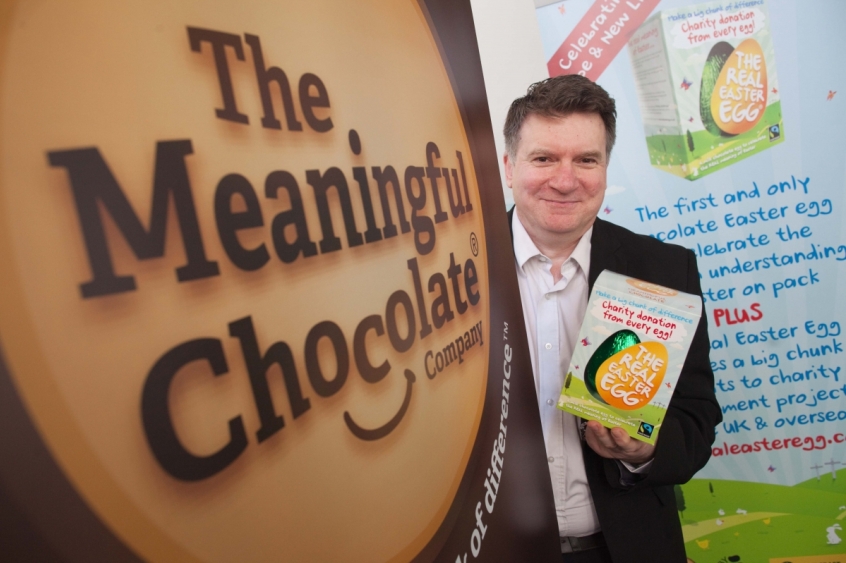
Ten years ago, David Marshall was looking for an Easter egg that mentioned the Christian faith. To his shock, he couldn't find one.
This startling revelation was the springboard for the Meaningful Chocolate Company and the Real Easter Egg, which a decade on still cuts a lonely figure in the sea of chocolate eggs filling up supermarket shelves that make no reference whatsoever to the Christian origins of the festival.
But the fact that the Real Easter Egg is even still there on the shelves isn't something David takes for granted - after all, when the egg was first launched, the supermarkets were reluctant to stock it.
As the Real Easter Egg marks its 10th anniversary, David speaks to Christian Today about this impressive milestone and why he's as passionate about it now as he was then.
CT: You had no experience in the chocolate business when you launched the Real Easter Egg. What inspired you?
David: It all started when I was given an Easter egg that claimed Easter was a festival about love and chocolate. I tried to find who was making Easter eggs talking about faith, and there was nobody at all doing that. It was a shocking moment when I discovered that there were around 80 million Easter eggs being exchanged at Easter and not a single one of them explaining the Christian faith.
The Christian faith had been entirely removed from a huge gifting season in our calendar. How on earth did that happen without anyone noticing? People talk about faith being removed from Christmas and yet here too, there was no reference to Jesus or the religious aspect of the festival. Not only that, but there was hardly any Fairtrade or charitable donation happening.
We wanted to provide a response - a solution - to the status quo and share the Easter story, and by that, establish a new tradition of giving a faith-based Easter egg.
CT: It seems like quite early on you had the support of bishops in the Church of England. That must have been a real encouragement?
David: In September 2010, we had a meeting with about 20 bishops at the Bishop of Oxford's residence where we explained that while our vision was to share the message of faith through Easter eggs, we didn't have the marketing budget and therefore needed the help of the bishops to spread the word among clergy and churches.
We were really starting from zero in quite a hostile market. One by one, every supermarket turned down the egg. On the back of that, we effectively invented crowdfunding by going straight to churches and church schools, and sharing our plan with them. The September before we launched, we effectively went to them and said: we need you to buy them.
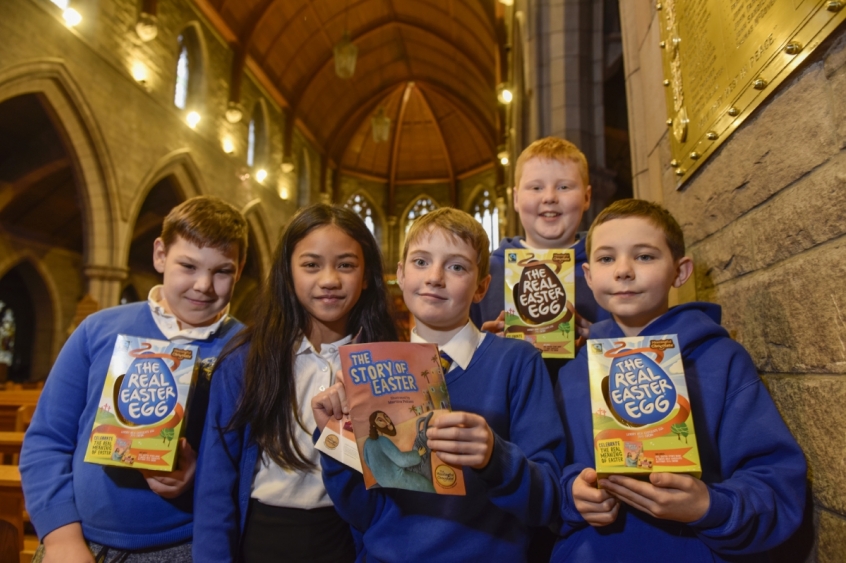
CT: The supermarkets eventually came round, didn't they?
David: The supermarkets took about two years to come on board. Some members of the supermarket buying teams who were churchgoers started to hear about the Real Easter Egg and approached us because they wanted to order. Within 24 months, by the time we got to the second Easter, they were looking to stock. After 10 years, it's quite remarkable that we are still on supermarket shelves.
But actually most of our stock is sold online because we can't get enough supermarket shelf space to be able to tell people to go to their local supermarket to find a Real Easter Egg. We've sent about 750,000 eggs through the post over the years.
CT: Did the supermarkets have a specific objection to stocking the eggs?
David: It is very difficult to get a new product into the supermarkets and until customers start requesting the product, it's just very hard. You're basically going to supermarkets and saying: take off a very well known brand and replace it with this one. They have to make a call on whether they think there's going to be the demand or whether the price is right for it to work. These are the kinds of difficulties that any new product will face trying to get into a supermarket. What they really want to know is: is this going to sell?
CT: Thinking back to 10 years ago when you were trying to get this off the ground, it does seem to have been a bit of a leap of faith. Did you feel that at the time?
David: Absolutely! Who starts a Fairtrade chocolate company with no background in chocolate?! But I also knew that it was something that any church would understand because back then, everybody was buying non-fairtrade Easter eggs that were all about the amount of chocolate and not the quality.
With the launch of the Real Easter Egg, we were doing something that allowed them to give something different while also telling the story about Jesus in a way that wasn't embarrassing. The designs are commercial and stand up against the other products on the shelves, and the books we put inside are of a high enough standard that they could be sold commercially. They're only available with the eggs but the quality is good enough to be sold commercially - we only use the top illustrators to illustrate the products.
To find ourselves, 10 years on, being one of the biggest publishers of children's faith books and the biggest mail order Easter egg company, it has definitely been a leap of faith!
CT: Did you have any idea at the time that it was going to become as big as it did?
David: We knew at the time we were putting this together that there would have to be a national response and it would have to appeal across all denominations for it to work. So we needed to tell the Easter story in a way that allowed churches to use it within their own particular traditions.
But the aim of the campaign was to become a fixture of Easter celebrations for churches and churchgoers. The first year, we just sold out and were inundated with orders because it was so new and different. But by around the third year, we were nervous because we were wondering if churches would by this point be feeling like: well, we've done that now.
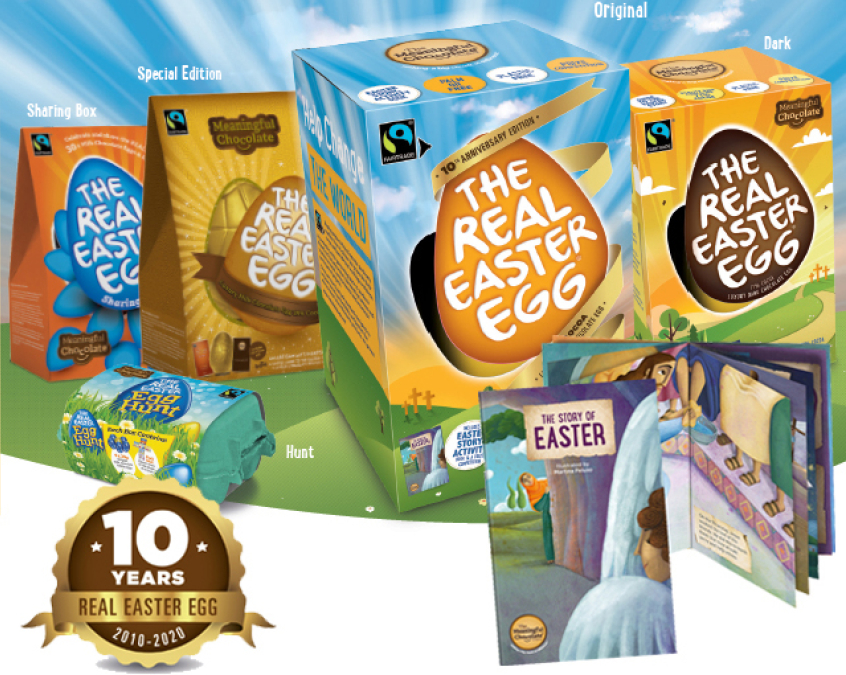
We were worried they wouldn't be interested any more. Thankfully that didn't happen and we've experienced what Harry Potter experienced in that, 10 years ago kids who were maybe eight or nine are now 18 or 19, and so we have a whole new generation coming up who have grown up with the Real Easter Egg and are telling people about it.
But one thing I also knew was that churches were instrumental in founding the Fairtrade movement. If it wasn't for the churches putting pressure on the supermarkets and various buyers, and holding Fairtrade stalls at the back of their churches, the movement wouldn't have grown as quickly. It was churches that helped establish Fairtrade simply because of their passion for putting their faith into practice. And I knew they would do the same with a Fairtrade Easter egg that reflected faith values.
CT: I presume most of your customers are churches and church schools but do you have interest from non-faith customers too?
David: We do. Sometimes our customers have been big companies who just wanted to give their employees something different. And strangely, we are one of the few Easter eggs on the shelves that are plastic-free and so some people who are looking specifically for a Fairtrade, plastic-free Easter egg stumble upon the Real Easter Egg and see the story book as a bonus.
It's interesting to see the different reasons that people buy the Real Easter Egg. It's mostly church people or because it has the Easter story in the box. The kids love the book and get a lot from that.
I think the three elements of telling the Easter story, being Fairtrade and supporting charitable causes has kept it fresh and helped us to reach different audiences. You can only continue to appeal if you have good content and good chocolate, and we've tried to continually change the content.
CT: The Real Easter Egg is aimed at children but it will probably benefit a lot of adults in the UK too as many now no longer know the Christmas story either.
David: Yes, one of the criteria we have when choosing illustrators is that the drawings have to appeal to both children and adults, so they are very beautiful and sophisticated while also communicating the story to children. Adults will be able to appreciate the quality of the artwork and for some, it will be the first time they've read the Easter story too. That can be the case especially for parents or grandparents reading the book to young children who are not yet able to read it by themselves.
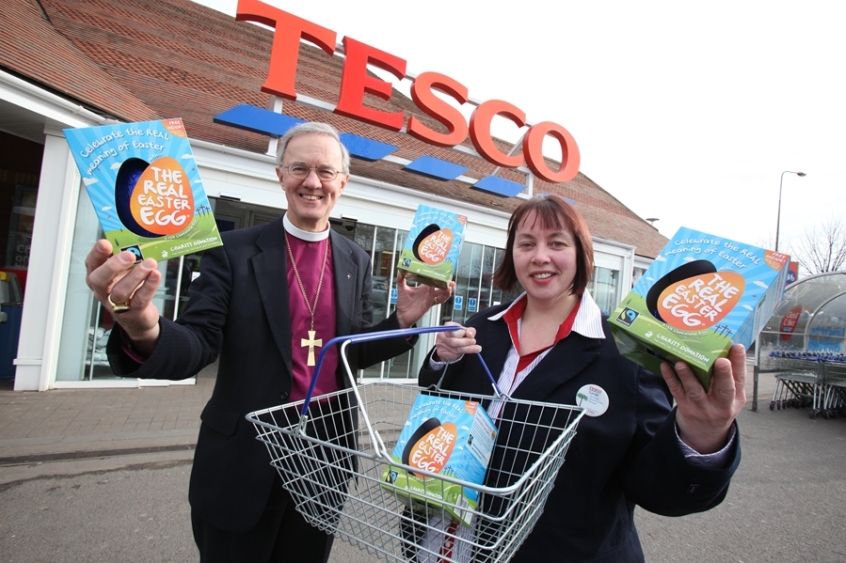
CT: One of the things that's very important to you is giving to charity.
David: We've given something like £250,000 over the last decade, some as direct donations and some in the form of the fees and Fairtrade Premium we give to the growers, which is above their minimum price.
A few years ago we started a scheme allowing people to donate an egg to a foodbank and that's been extremely popular. When they buy their Easter egg they can put into their basket another egg for a family who they will never know or meet, but for whom the gift of a Real Easter Egg may just mean something this Easter. About 500 eggs have been donated in the run-up to this Easter alone and that will probably reach about 800 to 1,000 by the time Easter actually comes round.
CT: Your eggs don't contain any palm oil. What's the significance of not using palm oil?
David: Chocolate is a natural product but confectioners are allowed to add up to 5% of oil to the chocolate to pad it out and make it cheaper. Different companies put different oils in to dilute the chocolate because cocoa butter is so expensive, and one of these is palm oil because it is much cheaper than cocoa butter. People think commercial chocolate is creamy but what they don't realise is that it's actually the shea butter or palm oil.
But palm oil is responsible for a lot of deforestation and it is leading to huge swathes of forest being eradicated in order to provide this cheap oil to fill out the chocolate bars. And it's possible that in Britain's post-Brexit trade talks with the US, there will be pressure to raise this 5% threshold even higher.
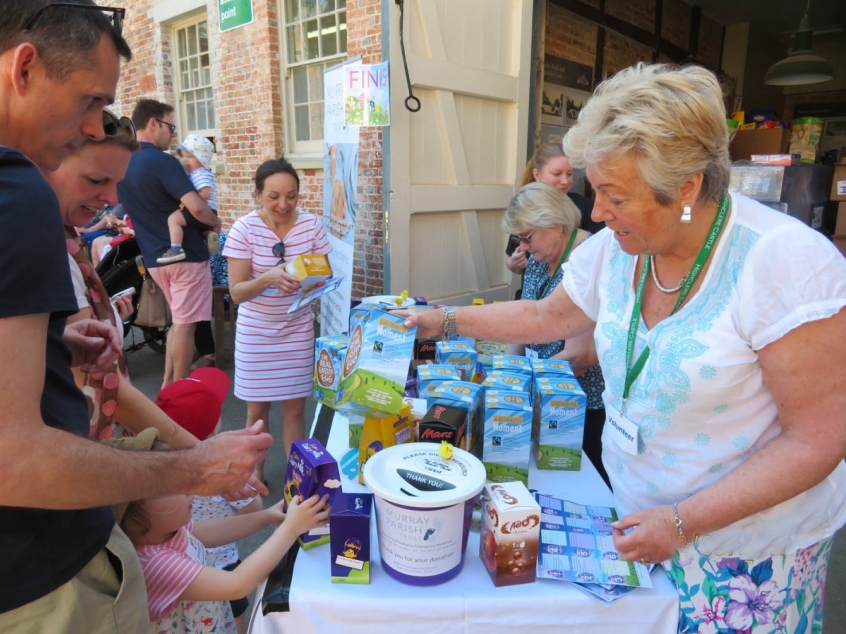
We don't use palm oil in our Easter eggs; that's part of our ethical position. We're plastic-free, we're reducing the amount of cardboard we use in our packaging, and we don't put palm oil in our chocolate. That means it's fairly expensive for us to buy the chocolate we use in our products but the taste is much better and more genuine, as opposed to an artificial taste.
CT: You don't only offer an Easter egg, but you also offer an Advent calendar. Was that started with a similar idea in mind?
David: Yes, I had noticed at Christmas that none of the Advent calenders on sale had anything to do with the purpose of Advent. They were cartoon characters from films, none of them were Fairtrade and they avoided mentioning anything to do with faith.
We introduced the Real Advent Calendar eight years ago as a way of countering that and it follows the same pattern as the Real Easter Egg, coming with a copy of the Christmas story inside the box. The book has 24 pages, one for each day of Advent, meaning that people are engaging with the Christmas story for nearly a whole month. It's also Fairtrade and part of the profits support charitable causes.
CT: Are there any concerns that coronavirus might have some impact on this year's sales?
David: Yesterday we actually had our busiest sales day ever! We sold nearly 4,000 eggs through our online shop so at the moment everything is selling very well. Every year we're amazed by the response. There are always risks. You have to listen to feedback and change things, but every year in faith we hope the churches will respond. I love knowing that the eggs are being passed on and that lives in other parts of the world are being changed because of Fairtrade. And who knows what difference the Easter story will make to somebody's life?













